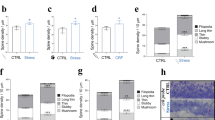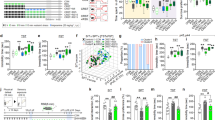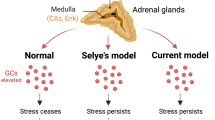Abstract
The induction of activity-dependent persistent increases in synap-tic efficacy, such as long-term potentiation (LTP), is inhibited by behavioural stress1,2. The question arises whether stress also affects the ability to induce persistent decreases in synaptic efficacy, such as long-term depression (LTD)3–5. We now report that the induction of stable homosynaptic LTD in the CA1 area of the hippocampus of awake adult rats is facilitated, rather than inhibited, by exposure to mild naturalistic stress. The same stress blocked the induction of LTP. The effects of such stress were short lasting: acclimatization to, or removal from, the conditions that facilitated LTD induction led to a rapid loss of the ability to elicit this form of plasticity. The time window in which LTD could be reliably elicited was prolonged by inducing anaesthesia immediately after the stress. These data reveal that even brief exposure to mild stress can produce a striking shift in the susceptibility to synaptic plasticity in the awake animal.
This is a preview of subscription content, access via your institution
Access options
Subscribe to this journal
Receive 51 print issues and online access
$199.00 per year
only $3.90 per issue
Buy this article
- Purchase on Springer Link
- Instant access to full article PDF
Prices may be subject to local taxes which are calculated during checkout
Similar content being viewed by others
References
Diamond, D. M. et al. Exposure to a novel environment interferes with the induction of hippocampal primed burst potentiation. Psychobiology 18, 273–281 (1990).
Shors, T. J. et al. Inescapable versus escapable shock modulates long-term potentiation in the rat hippocampus. Science 244, 224–226 (1989).
Linden, D. J. & Connor, J. A. Long-term synaptic depression. Annu. Rev. Neurosci. 18, 319–357 (1995).
Bear, M. F. & Abraham, W. C. Long-term depression in hippocampus. Annu. Rev. Neurosci. 19, 437–462 (1996).
Dudek, S. M. & Bear, M. F. Bidirectional long-term modification of synaptic effectiveness in the adult and immature hippocampus. J. Neurosci. 13, 2910–2918 (1993).
Errington, M. L. et al. Stimulation at 1–5 Hz does not produce long-term depression or depotentiation in the hippocampus of the adult rat in vivo. J. Neurophysiol. 74, 1793–1799 (1995).
Staubli, U. & Lynch, G. Stable depression of potentiated synaptic responses in the hippocampus with 1–5 Hz stimulation. Brain Res. 513, 113–118 (1990).
Doyle, C. A. et al. Low-frequency stimulation induces homosynaptic depotentiation but not long-term depression of synaptic transmission in the adult anaesthetized and awake rat hippocampus in vivo. Neuroscience 77, 75–85 (1997).
Balfour, D. J. K. & Reid, A. Effects of betamethasone on the stimulation of corticosterone secretion in rats. Arch. Int. Pharmacodyn. Ther. 237, 67–74 (1979).
Barrionuevo, G., Shottler, F. & Lynch, G. The effects of repetitive low frequency stimulation on control and “potentiated” synaptic responses in the hippocampus. Life Sci. 27, 2385–2391 (1980).
Thiels, E., Barrionuevo, G. & Berger, T. W. Excitatory stimulation during postsynaptic inhibition induces long-term depression in hippocampus in vivo. J. Neurophysiol. 72, 3009–3016 (1994).
Heynen, A. J., Abraham, W. C. & Bear, M. F. Bidirectional modification of CA1 synapses in the adult hippocampus in vivo. Nature 381, 163–166 (1996).
Joëls, M. & de Kloet, E. R. Corticosteroid hormones: endocrine messengers in the brain. News Physiol. Sci. 10, 71–76 (1995).
Diamond, D. M. et al. Inverted-U relationship between the level of peripheral corticosterone and the magnitude of hippocampal primed burst potentiation. Hippocampus 2, 421–430 (1992).
Kerr, D. S. et al. Modulation of hippocampal long-term potentiation and long-term depression by corticosteroid receptor activation. Psychobiology 22, 123–133 (1994).
Pavlides, C. et al. Hippocampal homosynaptic long-term depression/depotentiation induced by adrenal steroids. Neurosdence 68, 379–385 (1995).
Kim, J. J., Foy, M. R. & Thompson, R. F. Behavioral stress modifies hippocampal plasticity through N-methyl-D-aspartate receptor activation. Proc. Natl Acad. Sci. USA 93, 4750–4753 (1996).
Bear, M. F. Mechanism for a sliding synaptic modification threshold. Neuron 15, 1–4 (1995).
Doyle, C. A. et al. The selective neuronal NO synthase inhibitor 7-nitro-indazole blocks both long-term potentiation and depotentiation of field EPSPs in rat hippocampal CA1 in vivo. J. Neurosci. 16, 418–426 (1996).
O'Conor, J. J., Rowan, M. J. & Anwyl, R. Serotonergic involvement in the inhibitory effects of repeated buspirone treatment on synaptic transmission in the hippocampus of alert rats. Eur. J. Pharmacol. 167, 21–29 (1989).
Manahan-Vaughan, D., Anwyl, R. & Rowan, M. J. Adaptive changes in 5-HT1A receptor-mediated hippocampal inhibition in the alert rat produced by repeated 8-OH-DPAT treatment. Brit. J. Pharmacol. 112, 1083–1089 (1994).
Author information
Authors and Affiliations
Rights and permissions
About this article
Cite this article
Xu, L., Anwyl, R. & Rowan, M. Behavioural stress facilitates the induction of long-term depression in the hippocampus. Nature 387, 497–500 (1997). https://doi.org/10.1038/387497a0
Received:
Accepted:
Issue Date:
DOI: https://doi.org/10.1038/387497a0
This article is cited by
-
Neurocognitive effects of stress: a metaparadigm perspective
Molecular Psychiatry (2023)
-
Repeated stress exposure leads to structural synaptic instability prior to disorganization of hippocampal coding and impairments in learning
Translational Psychiatry (2022)
-
Enduring glucocorticoid-evoked exacerbation of synaptic plasticity disruption in male rats modelling early Alzheimer’s disease amyloidosis
Neuropsychopharmacology (2021)
-
Signaling mechanisms of μ-opioid receptor (MOR) in the hippocampus: disinhibition versus astrocytic glutamate regulation
Cellular and Molecular Life Sciences (2021)
-
The Amygdala Responds Rapidly to Flashes Linked to Direct Retinal Innervation: A Flash-evoked Potential Study Across Cortical and Subcortical Visual Pathways
Neuroscience Bulletin (2021)
Comments
By submitting a comment you agree to abide by our Terms and Community Guidelines. If you find something abusive or that does not comply with our terms or guidelines please flag it as inappropriate.



